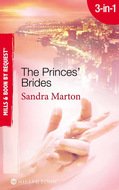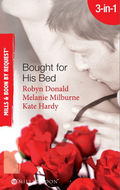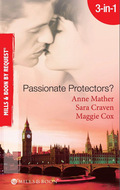Kitab fayl olaraq yüklənə bilməz, yalnız mobil tətbiq və ya onlayn olaraq veb saytımızda oxuna bilər.
Kitabı oxu: «The Billionaire's Conquest»
The Billionaire’s Conquest
Caught In The Billionaire’s Embrace
Elizabeth Bevarly
Billionaire, M.D.
Olivia Gates
Her Tycoon To Tame
Emilie Rose

MILLS & BOON
Before you start reading, why not sign up?
Thank you for downloading this Mills & Boon book. If you want to hear about exclusive discounts, special offers and competitions, sign up to our email newsletter today!
Or simply visit
Mills & Boon emails are completely free to receive and you can unsubscribe at any time via the link in any email we send you.
Table of Contents
Cover
Title Page
Caught in the Billionaire’s Embrace
About the Author
Dedication
One
Two
Three
Four
Five
Six
Seven
Eight
Nine
Ten
Billionaire, M.D.
About the Author
Dedication
One
Two
Three
Four
Five
Six
Seven
Eight
Nine
Ten
Eleven
Twelve
Thirteen
Fourteen
Her Tycoon To Tame
About the Author
Dedication
One
Two
Three
Four
Five
Six
Seven
Eight
Nine
Ten
Eleven
Twelve
Copyright
Caught In The Billionaire’s Embrace
Elizabeth Bevarly
ELIZABETH BEVARLY is the RITA® Award-nominated, nationally bestselling author of more than five dozen books. When she’s not writing, she’s watching Project Runway and What Not to Wear, but only for research purposes. She’s also confident that she’ll someday find a story in House Hunters International, so she watches that religiously, too. In the meantime, she makes do with her real life of ready-to-wear from Macy’s and college exploratory trips around the Midwest with her husband and soon-to-be-a-senior son.
For everyone who’s ever worked in women’s fashion,
especially employees of The Limited stores
in Cherry Hill and Echelon Malls,
where I got my start in writing by penning pages
in the stockroom during lunch.
I miss you guys. A lot.
One
There was only one thing that could make Della Hannan’s thirtieth birthday better than she’d already planned for it to be, and it was a thing she hadn’t even planned. That was saying something, since she’d been fine-tuning the details for the celebration since she was a little girl growing up in the kind of neighborhood where birthdays were pretty much unaffordable and therefore pretty much ignored. Where a lot of things were unaffordable and therefore ignored. Things like, well … Della, for instance. But that was why she had promised herself such a festive event. Because, even as a little girl, she’d known she had only herself to count on.
Of course, the past eleven months had rather thrown a wrench in that line of thinking, because since meeting Geoffrey, she’d had no choice but to count on him. Geoffrey wasn’t here tonight, though, and she wasn’t going to let herself think about him or anything else from that world. Tonight was special. Tonight was for her. And it would be everything an underprivileged kid from one of New York’s roughest neighborhoods could have imagined.
Back then, Della had sworn that by the time she turned thirty, she would have escaped the mean streets of her borough and become a self-made millionaire living park-side uptown. And she’d vowed to mark the big three-oh in the style of the rich and famous, that she had imagined she’d become accustomed as this point in life. She wasn’t about to renege on that promise, even if she was celebrating in Chicago instead of New York. She would begin with dinner at a five-star restaurant, follow that with a box seat at the opera and top it off with a nightcap at the sort of club that allowed entrée to only the crème de la crème of society. She was outfitted in thousands of dollars worth of haute couture, dripping in rubies and diamonds, and she had been coiffed and manicured at the city’s finest salon.
She sighed with much contentment as she enjoyed the first part of her evening. Palumbo’s on State Street was the sort of restaurant where prices rivaled the budgets of some sovereign nations. She had, it went without saying, ordered the most expensive items on the menu—four courses, all of which bore European names she’d had to practice all week to pronounce correctly. (Thank goodness the menu had been posted online so she could check in advance and not appear as some kind of philistine when she ordered. And how lovely to have the opportunity to use the word philistine, even if it was only in her head.) Because ordering the most expensive items on one’s birthday was what anyone who was sophisticated and chic and rich would do, right?
The thought made her surreptitiously survey her surroundings, to make sure the other diners—sophisticated, chic and rich, every last one of them—were also enjoying the most expensive bounty. And, okay, okay, to also make sure Geoffrey hadn’t somehow followed her, even though she’d done an excellent job sneaking out—she always did—and even though she wasn’t scheduled to check in with him until her daily call tomorrow. He couldn’t know where she was going, anyway, even if he did discover she’d slipped out when she wasn’t supposed to. She’d planned tonight’s escape even more meticulously than she’d planned her thirtieth birthday celebration.
For all anyone here knew, she was just as blue-blooded as they were and belonged in this society every bit as much. And, thankfully, there was no sign of Geoffrey anywhere. Check and check.
And Della did feel as if she belonged here, sipping champagne as she anticipated the arrival of her calamari appetizer. She’d been moving in environments like this for years, despite not having been born into a wealthy family. She’d clawed her way out of the slum and into the upper echelons of society—even if she’d only been a fringe member—and she’d studied and emulated everyone in this world until she’d had no trouble passing herself off as a pure-blooded member.
Tonight was no exception. She’d paid a not-so-small fortune to rent the crimson velvet Carolina Herrera gown and Dolce & Gabbana shoes, not to mention the Bulgari earrings and pendant and the black silk Valentino opera coat necessitated by the frigid December temperatures. The red hues, she knew, complemented her gray eyes and the dark blond hair that was long enough now to have been swept up into a French twist, held in place by a single hidden comb.
She lifted a hand to make sure every hair was in place, smiling at how much she enjoyed having it long. She’d worn it boyishly short all her life, until earlier this year, and hadn’t sported her natural color since high school, when she’d dyed her hair black during her grunge phase and liked it enough to keep it that way. She hadn’t even realized how it had deepened to such a beautiful honey-infused blond over the years. Between her natural color and the new length—not to mention her rented duds—no one from the old neighborhood would recognize her tonight.
But she wasn’t thinking about any of that, either, she reminded herself. Tonight really was going to be perfect. It really was going to be everything she had planned all those years ago.
Except maybe for the handsome, elegantly attired man the hostess had seated at a table near hers a few moments ago, and whom she hadn’t been able to resist sneaking peeks at during each of those moments. When Della was a kid, she’d never entertained the idea of having a companion for her special evening. She wasn’t sure why not. Maybe because of the aforementioned knowing she would always have only herself to count on. Or maybe because, as a kid, she couldn’t even imagine a guy like him. In her neighborhood, elegantly attired had meant one’s shirt was buttoned. And handsome had meant a guy had all his teeth.
Without warning, the man glanced up, his gaze connecting with hers. Something between the two of them … clicked. Or something. The man dipped his dark head toward Della in silent acknowledgment, one corner of his mouth lifting in something vaguely resembling a smile. After only a moment’s hesitation, she lifted her glass in a silent toast to him. Swathed in a tuxedo that had been tailored to emphasize every magnificent inch of him, he was framed by billows of amber silk that edged the window behind him. His dark eyes were warmed by the dreamy light of the candle flickering in a crystal holder in front of him, and his little half smile sent a shudder of something hot and electric skittering down Della’s spine. Because it was the kind of smile that told a woman he was not just undressing her with his eyes, but he was also considering using a lot of his other body parts on her, too.
When she felt the heat of a blush creep into her cheeks, she hastily glanced away. Lifting her champagne to her mouth for a cooling sip, she did her best to focus on something else—the crisp white tablecloths, the sparkling china, the glittering crowd. Inescapably, however, her attention wandered back to the man at the table opposite hers.
Who was still gazing at her with much interest.
“So what do you think?” he asked her, raising his voice enough to be heard two small tables away from his own.
Della blinked at him, nonplussed. Understanding, for the first time in her life, what nonplussed actually meant: confusion mixed with a funny little buzz in the belly that wasn’t altogether unpleasant. A million different possible replies to his question ricocheted around in her brain. I think you’re the most beautiful man I’ve ever seen, for example. And, what are you doing New Year’s Eve? Even a smooth, hey, lover. And of course—it went without saying—oh, bay-bee!
“For dinner,” he added, holding up the menu. “What do you recommend?”
Ooooh, what did Della think about that? Well, that was a totally different question from the one she’d been thinking he asked, wasn’t it? Good thing she’d been too nonplussed to answer.
“Um, I’m not sure,” she said. “This is the first time I’ve dined here.” Somehow, she didn’t think a man like him would be too impressed if she told him to order whatever was most expensive, because it would make him appear chic, sophisticated and rich. He was all those things simply by existing on the planet.
Her answer seemed to surprise him. “But how can this be your first time? Palumbo’s has been a Chicago institution for nearly a hundred years. Are you not from Chicago originally?”
There was no way Della was going to answer that question. Mostly because no one other than Geoffrey knew she was here, and he was keeping much too close an eye on her. Even if he didn’t know exactly where she was at the moment, she wasn’t about to risk his discovery of her little escape by breathing a word of it to anyone.
So she wouldn’t—couldn’t—tell this man that. Either she’d have to lie—which Della never did, even though her honesty had gotten her into trouble more than once, as evidenced by her having to rely on Geoffrey at the moment—or else her reply would lead to the kind of small talk that might make her talk about her past. Or, even worse, her present. And she wanted to be as far removed from both of those tonight as she could be, on account of nothing in her past or present lent itself to Carolina Herrera gowns or diamonds and rubies or box seats to La Bohème.
So she replied instead to the first question he’d asked. “I ordered the special. I adore seafood.”
He said nothing for a moment, and Della wondered if it was because he was pondering her answer to his first question or trying to decide whether or not to press the fact that she hadn’t replied to the second. Finally, he said, “I’ll remember that.”
For some reason, though, he made it sound as if it were the fact that she loved seafood that he would remember, and not that she had recommended it for dinner.
He opened his mouth to say something else, but his server arrived to place a short, amber-colored cocktail in front of him and a dewy pink cosmopolitan on the table at the place directly next to his.
He was expecting someone to join him, Della realized. A woman, judging by the color and daintiness of the drink. Couples didn’t dine in places like Palumbo’s unless their relationship went beyond casual—or one of them was looking to make it more than casual. This guy was throwing steamy glances her way, even flirting with her, despite the fact that there would be a woman joining him momentarily. That meant the guy was a complete jerk.
Okay, so maybe her thirtieth birthday celebration wasn’t going to go quite as perfectly as she had planned, since she was going to have to be seated near a jerk. And—oh, all right—maybe it wasn’t only because of the jerk that the celebration wouldn’t be exactly what she’d had in mind. Maybe it wasn’t even because her gown and accessories were rentals from a Michigan Avenue boutique instead of pulled casually from her own closet.
Maybe, just maybe, it was because, in addition to not being the life of a millionaire, Della’s current life wasn’t even her own. Everything about her life these days—every thing she did, every place she went, every word she spoke—had to be vetted and controlled by Geoffrey. Her life would never be normal again. Or, at least, it would never be the life she had made for herself or the one she had planned. It would be a life manufactured and orchestrated by someone else.
As soon as the thought formed, she pushed it to the furthest, darkest recesses of her brain. She wouldn’t think about any of that tonight, she reminded herself again, wondering why she was finding it all so hard to forget. Because tonight, she didn’t want to be Della anyway. Tonight, for one night, she wanted to be the woman she had envisioned herself to be two decades and two thousand miles ago: CinderDella, toast of the town and belle of the ball. Nothing was going to mar this evening. Not even Prince Less-Than-Charming over there who was still making bedroom eyes at her while waiting on a girlfriend who could do a helluva lot better.
As if cued by the thought, the hostess seated a boisterous party of four at the table between them, completely blocking the man from her view. For that Della was grateful and not disappointed, even if some twisted part of her made her think that was what she was feeling.
Well, even if he was a jerk, he was still the most beautiful man she’d ever seen.
And she saw him again an hour and a half later—at the Lyric Opera when she was trying to locate her seat. After realizing she was in the wrong part of the auditorium, Della asked an usher for directions, then found herself gazing at a box across the room that afforded an amazing view of the stage … and where sat the handsome stranger she’d seen at dinner. Just as he’d
been at the restaurant, he was surrounded by gold, this time a cascade of engraved gilt that encrusted the walls and ensconced the stage. Likewise as he’d been at the restaurant, he was seated alone.
Okay, so maybe as she’d left Palumbo’s, Della had happened to notice that his date still hadn’t shown up. Not that she’d been trying to notice that. She just had, that was all. Though whether the woman had gotten waylaid somewhere and been unable to make their rendezvous, or she’d wised up about what kind of man he was, Della couldn’t have said.
Not that she cared either way. Hey, she’d barely noticed. In case she hadn’t mentioned that.
Now as she strode down the aisle to her seat, she similarly barely noticed that it was not only in the same box the man was occupying, but also in the same row, as well—a small one at the front that contained only three chairs. She also barely noticed that he had placed both a program and a long-stemmed rose on the seat beside his own, as if the chair would soon be occupied. So evidently his girlfriend had indeed been waylaid earlier and was intending to catch up to him here.
Butterflies head-butted Della’s midsection at the prospect of having to sit in such close proximity to the man. Once she squeezed past him to get to her seat, there would be no escaping him—unless she wanted to pull a Groucho Marx maneuver from A Night at the Opera and swing across the auditorium on a cable.
She inhaled a single, fortifying breath and forced her feet to move forward until she stood at the edge of the row beside him. His head snapped up, and, when he recognized her, he grinned that shudders-down-the-spine grin again. Heat flared in her belly, her brainturned to mush, and the excuse me Della had been about to utter evaporated in her mouth.
He murmured a greeting as he stood, but she barely heard it, because she was too busy trying not to swoon. Not only did he smell delectable—a luscious mix of spice and wood smoke—but he was also much taller than she’d realized, forcing her to tip back her head to meet his gaze. It was an action to which she was unaccustomed, since she pushed the six-foot mark herself in the two-inch heels she was wearing. Even without heels, she was accustomed to being at eye level with virtually everyone. With this man, however, eye level meant gazing at shoulders that spanned a distance roughly the size of Montana.
But it was his face that drew her attention. His jawline was resolute, his nose was straight and refined, his cheekbones looked as if they’d been hewn from marble, and his eyes … Oh, his eyes. His eyes were the color of bittersweet chocolate, a brown so dark and so compelling that Della couldn’t tear her gaze away. Then she realized it wasn’t the depth or color of his eyes that so captivated her. It was her recognition of something in them that was at odds with his dazzling smile. A somberness, even sadness, that was unmistakable.
The moment she identified it, however, a shadow fell over his eyes, almost as if he was aware of her understanding and didn’t want her to see too deeply into him.
“We’ve got to stop meeting like this,” he said, his smile broadening.
The humor in his tone surprised her, coming as it did on the heels of the shadows in his eyes. Even so, she couldn’t quite keep herself from smiling back. “It is a little odd, isn’t it?”
“Actually, I’m thinking of a different word.” Not sure that she wanted to know what it was, she heard herself ask anyway, “Oh?”
“Lucky,” he said immediately. “I was thinking it was lucky.”
She wasn’t sure what to say in response to that, so she held up her ticket and gestured toward her seat. She made sure to give the rose-laden chair between hers and his a meaningful inspection before saying, “If you don’t mind? That’s my seat.”
For a minute, he only continued to gaze at her, his eyes revealing nothing now of what might be going through his head. Then, “Not at all,” he replied, sidestepping into the aisle to give her room to pass.
When he did, she hastened to take her seat, immediately opening her program to read it before he had a chance to say anything that might start a conversation.
He didn’t take the hint, however, and said as he returned to his seat, “How was your dinner?”
Not looking up from the program, Della replied,
“Lovely.”
Her one-word response did nothing to dissuade him, either. “I ended up ordering the pheasant. It was amazing.”
When Della only nodded silently without looking up from her program, he added, “You should try it next time you’re at Palumbo’s. I highly recommend it.”
He was fishing. Trying to find out if she lived here in town the same way he had when he’d asked her why she’d never been to Palumbo’s. He was trying to gauge whether or not there was a chance the two of them might run into each other again, either by accident or by design. Even with a long-stemmed rose and mystery woman between them.
“I’ll take it under advisement,” she told him. And returned to reading her program.
But still, he didn’t take the hint. “You know, I don’t meet many people of my own generation who enjoy opera,” he said, trying a new tack. “Especially not enough to see it performed live. Or spring for box seats. You must really love it.”
Della sighed inwardly, silently cursing him for the change of subject. That was a low blow. There was no way she could resist a conversation about her most favorite thing in the world.
“I adore it, actually,” she said helplessly, letting the program fall open onto her lap.
When she turned to look at him again, his expression made clear he was as delighted to be here as she was and that he felt every bit as passionately about opera. So passionately that his love for the medium had chased away the darkness that had clouded his eyes earlier. She realized now that they weren’t entirely brown. Flecks of gold wreathed the irises, making his eyes appear more faceted somehow, drawing her in even more deeply.
“I’ve loved opera since I was a little girl,” she told him. “Our next-door neighbor was a huge fan and introduced me to all the classics.” She didn’t add that that was only because she could hear Mrs. Klosterman’s radio through the paper-thin walls of their tenement, or how Della had hung on every word of the announcer’s analysis of each opera once it had concluded. “The first time I saw one performed live,” she continued, not bothering to mention that it was live on PBS, not live on stage, “I was enchanted.”
She actually would have loved to major in music and make the study of opera her life’s work. But college had been beyond the means of an average student from her economic stratum, so she’d gone directly to work after graduating from high school, as a gofer in the offices of one of Wall Street’s most noted and respected brokerage houses. And even though she’d worked her way up the corporate ladder to become an executive assistant, Della had never made the time to go for the degree. She’d been supporting herself fairly well on her salary—certainly better than she’d ever imagined she would growing up in the sort of neighborhood she had—and she’d been happy with the way her life was going. At least until that life had shattered into a million pieces, and she’d been left with nothing but Geoffrey, who’d offered her a dubious sort of refuge—and not without a price.
Almost as if that thought had cued the orchestra, the music swelled, and the lights dimmed. Della couldn’t resist one last look at her companion as the room grew dark, but when she saw him gazing at her—and noted the seat between them still empty—she quickly turned her attention to the stage.
After that, she fell into the world of Mimi and Rodolfo and their bohemian friends, leaving her own reality behind. So much so, that when the lights came up for intermission, it took Della a moment to return from nineteenth century Paris to twenty-first century Chicago. She blinked a few times and inhaled a deep breath and, before she could stop herself, looked over at her companion—who was looking at her in the same way he had been when the lights had dimmed, almost as if he’d spent the entire first half of the opera watching her instead.
That strange buzz erupted in her belly again, so she quickly glanced at the crowd. The myriad splendor of the women’s gowns made them look like brightly colored gems amid the gilt of the auditorium, the sparkle of their jewelry only enhancing the image. Della watched many of the ladies link arms with their companions as they left for intermission, and noted how the men bent their heads affectionately toward them as they laughed or chatted.
For a moment, she felt a keen regret that this night couldn’t last forever. Wouldn’t it be lovely to enjoy evenings like this whenever she wanted, without regard for their cost or the risk of being seen in a place where she shouldn’t be? She couldn’t remember the last time she’d had a night out at all, never mind one like this. Geoffrey kept her locked away like Rapunzel. She spent her time reading books, watching downloaded movies and staring at the walls that were, for all intents and purposes, her cell. Even if the place Geoffrey had provided lacked bars and held sufficient creature comforts, Della still felt like a prisoner. Hell, she was a prisoner. And she would be until Geoffrey told her she could go.
But even that thought brought little comfort, because she had no idea where she would go, or what she would do, once Geoffrey decided she was no longer necessary. She would have to start all over again with virtually nothing. The same way she had when she left the old neighborhood behind.
It was all the more reason to enjoy tonight to the fullest, Della told herself. Who knew what the future held beyond even the next few hours?
“So what do you think so far?”
She turned at the sound of the rich, velvety baritone, and her pulse rippled when she saw the smoky look he was giving her. Truly, she had to get a grip. Not only did the guy show evidence of being a class-A heel, flirting with one woman when he was supposed to be out with another, but he was also way out of Della’s league.
“I have to confess that La Bohème isn’t one of my favorites,” she admitted. “I think Puccini was a bit reserved when he scored it, especially when you compare it to the exhilaration of something like Manon Lescaut. But I am enjoying it. Very much.”
Of course, some of that might have had to do with the company seated in her box. Not that she had to tell him that. Not that she had to admit it to herself.
“How about you?” she asked. “What’s your verdict?”
“I think I’ve seen it too many times to be objective anymore,” he said. “But it’s interesting you say that about Puccini’s being too reserved with it. I’ve always kind of thought the same thing. I actually like Leoncavallo’s interpretation of Murger’s book much better.”
She grinned. “I do, too.”
He grinned back. “That puts us in the minority, you know.” “I know.”
“In fact,” he added, “I like Leoncavallo’s La Bohème even better than his Pagliacci, an opinion that will get you tossed out of some opera houses.”
She laughed at that. “I like it better than Pagliacci, too. Looks like we’ll be kicked to the curb together.”
He chuckled lightly, both of them quieting at the same time, neither seeming to know what to say next. After a couple of awkward seconds, Della ventured, “Well, if you’ve already seen La Bohème too many times, and you don’t care for it as much as you do other operas, then why are you here tonight? ”
He shrugged, but there was something in the gesture that was in no way careless, and the warmth that had eased his expression fled. “I have season tickets.”
Tickets, she repeated to herself. Not ticket. Plural, not singular. Meaning he was indeed the owner of the empty seat beside his and had been expecting someone to occupy it tonight. Someone who might very well be with him all the other nights of the season. A wife, perhaps?
She hastily glanced at his left hand but saw no ring. Still, there were plenty of married people who eschewed the ring thing these days. Della wondered who normally joined him and why she wasn’t here tonight. She waited to see if he would add something about the mysteriously empty chair. Something that might clarify the sudden drop in temperature that seemed to shimmer between them. Because she sensed that that vacant chair was what had generated the faint chill.
Instead, he shook off his odd, momentary funk and said, “That is how I know you don’t normally attend Lyric Opera performances. At least not on opening night, and not in the seat you’re sitting in tonight.” He smiled again, and the chill abated some. “I would have noticed.”
She did her best to ignore the butterflies doing the rumba in her stomach. “This is my first time coming here,” she confessed.
His inspection of her grew ponderous. “Your first time at Palumbo’s. Your first time at the Lyric. So you have just moved to Chicago recently, haven’t you?”
She was saved from having to reply, because the opera gods and goddesses—Wagnerian, she’d bet, every one of them—smiled down on her. Her companion was beckoned from below by a couple who had recognized him and wanted to say hello—and who addressed him as Marcus, giving Della his first name, at least. Then they proceeded to say way more than hello to him, chatting until the lights flickered once, twice, three times, indicating that the performance was about to resume. At that, the couple scurried off, and he—Marcus—turned to look at Della again.
“Can you see all right from where you are?” he asked. He patted the chair next to him that still contained the unopened program and rose. “You might have a better vantage point from this seat. You want to have the best angle for ‘Addio Dolce Svegliare Alla Mattina.'”
The Italian rolled off his tongue as if he spoke it fluently, and a ribbon of something warm and gooey unfurled in her. Even though the vantage point would be no different from the one she had now—which he must realize, too—Della was surprised by how much she wanted to accept his offer. Whoever usually sat there obviously wasn’t coming. And he didn’t seem to be as bothered by that as a man involved in a romantic relationship should be. So maybe his relationship with the usual occupant of the chair wasn’t romantic, in spite of the red, red rose.









